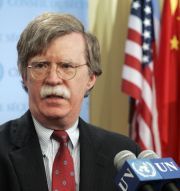US hails Sudan’s willingness to accept UN force in Darfur
May 6, 2006 (UNITED NATIONS) — US Ambassador John Bolton welcomed Khartoum’s “new willingness” to accept a UN peacekeeping force to take over from cash-strapped African Union (AU) troops in Sudan’s strife-torn Darfur region.
 Citing comments by Sudanese government representatives indicating they were now willing to accept the UN force, he said: “we view this as a very encouraging sign, the first positive outcome from the Abuja peace agreement.”
Citing comments by Sudanese government representatives indicating they were now willing to accept the UN force, he said: “we view this as a very encouraging sign, the first positive outcome from the Abuja peace agreement.”
He was referring to the peace deal signed in Abuja, Nigeria, between the Khartoum government and the main Darfur rebel faction.
Bolton said he hoped Sudan’s new stance meant that it would soon grant visas to the UN assessment team that is to undertake advance planning in Darfur for the deployment of the UN force.
“We view these initial comments by the government of Sudan in a positive light and look forward to their rapid implementation and hope this opens up a new chapter of cooperation to expedite the transition,” he told reporters before attending informal Security Council consultations on Iran.
Earlier Saturday, Sudan pledged to implement the peace deal and to help rebuild the war-torn western region of the country.
Khartoum and the main faction of the Sudanese Liberation Movement (SLM), led by Minni Minnawi, signed the Darfur agreement on Friday.
But another rebel group, the Islamist Justice and Equality Movement (JEM), and a smaller faction of the divided SLM, led by Abdelwahid al-Nur, refused to sign the AU-brokered deal.
Sudan urged them to come on board.
The accord offers a referendum on the future status of the region, obliges Khartoum to disarm and neutralize the Janjaweed by mid-October, provides for the rebel movements to be represented in the Sudanese government, and creates a fund for the reconstruction of Darfur.
The Security Council has authorized contingency planning for a UN force to take over from the under-equipped AU force that has failed to protect Darfur civilians from attacks by Khartoum-backed Arab militias.
The proposed force would retain a strong African component from the AU mission but would be complemented by robust air assets and specialized units from non-African countries, including from NATO, which currently provides air transport for the AU force.
War has been raging since early 2003 in Darfur, a poverty-stricken desert region the size of France, and humanitarian officials estimate that as many as 300,000 civilians have died of disease, hunger and militia attacks.
(ST)
